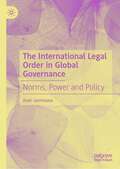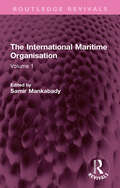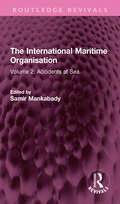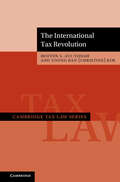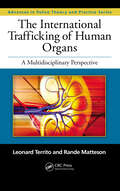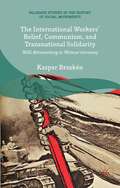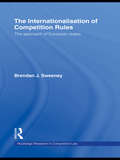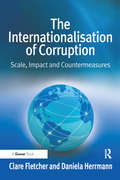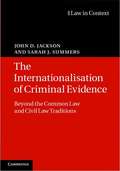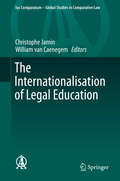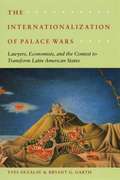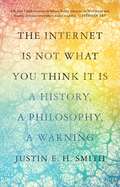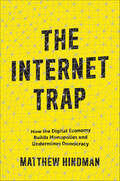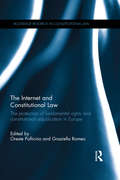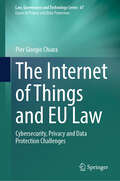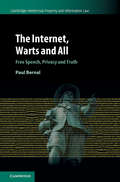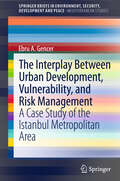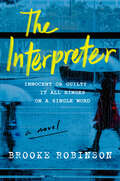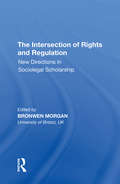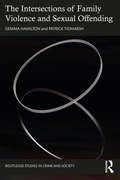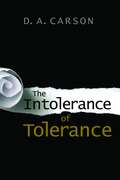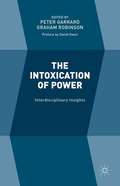- Table View
- List View
The International Legal Order in Global Governance: Norms, Power and Policy
by Alain GermeauxThe space occupied by international law in shaping political action is subject to continuing debate and controversy. This book aims to answer the question of how and why international law impacts the behaviour of actors on the international stage in the absence of central authority and faced with asymmetric power. At a time when the role of normative restraints in international relations, and international law in particular, has come under renewed questioning, it advances an analytical framework for understanding the effect of norms on behaviour that is not contingent on material restraints or a given political constellation, while being informed by the practical realities and practice of international organisation. In doing so, this book draws on an interdisciplinary range of sources, including international law, political theory, cognitive psychology and behavioural economics to explore a communicative action-based approach of how norms and ideas persuade actors to engage in a course of action consonant with international law to achieve a particular outcome. In probing the role of norms on questions such as the use of force and accountability, and issues of equity and justice, it examines the challenges international law faces and what the way forward may look like.
The International Legal Protection of Children in Street Situations (Children’s Well-Being: Indicators and Research #29)
by Sylvia AguThe book conducts a comprehensive analysis of codified international legal instruments and documents in their application to children in street situations, employing soft law documents to elucidate treaty interpretation and supplement existing legal standards. The research adopts a holistic approach, correlating international legal instruments with root causes and consequences for children in street situations, while systematically examining issues of intersectionality, such as economic, social, and cultural rights, civil and political rights, minority rights including disability rights, rights of the girl-child, as well as LGBTQI+ and migrant rights, reparations, impact of violence, and access to essential services like health, food, and housing, with various human rights issues, including economic, social, cultural, and civil-political rights. It presents the plight of children in street situations as a human rights concern, offering guidance on utilising international legal sources in rights claims procedures. The study also integrates sociological and political perspectives with legal and governmental policy issues, examining the influence of external factors such as conditional lending and structural adjustment programmes, wars, and decolonisation on social policies and their consequent impact on children and families by rendering children in street situations 'visible' as a distinct category requiring urgent attention in State policy formulation. By systematically integrating international legal instruments with practical policy considerations and applications concerning children in street situations, this scholarly work serves as a comprehensive legal framework for State governments, their bodies and social workers, and a valuable advocacy guide for interest groups including non-governmental organisations, proposing future directions for policy and research for addressing the rights and needs of children in street situations.
The International Maritime Organisation: Volume 1 (Routledge Revivals)
by Samir MankabadyOriginally published in 1984, this book provides a survey of the shipping rules adopted under the auspices of the International Maritime Organisation (IMO) during the latter part of the 20th Century. Its scope is wide-ranging, and, since the measures adopted by the IMO cover a great variety of disciplines, the papers in this book are written with clarity and authority by a number of experts
The International Maritime Organisation: Volume 2: Accidents at Sea (Routledge Revivals)
by Samir MankabadyOriginally published in 1987, this book provides a comprehensive manual to the international law governing accidents at sea during the 1980s. It is a complementary study to International Maritime Organisation, now recognised as a standard work on this UN agency. Among the subjects covered in Part 1 are: reporting and investigation of accidents; accidents caused by collision; civil and criminal liability; accidents caused by non-marking wrecks. Part 2 deals with the consequences of accidents and contains a considerable body of law and regulations on oil and chemical pollution, salvage and personal injury
The International Tax Revolution (Cambridge Tax Law Series)
by Christine Kim Reuven S. Avi-YonahThe International Tax Revolution offers the first comprehensive analysis of the profound changes in international taxation over the past decade, culminating in the landmark October 2021 agreement by over 140 countries to implement a global corporate minimum tax and modify profit allocation and nexus rules for the digital economy. The book provides a historical narrative of how the original International Tax Regime (ITR) crumbled under the pressures of globalization and tax competition between 1980 and 2008, and how the financial crisis of 2008-2010 and subsequent cuts to social welfare programs spurred governments to adopt new approaches to taxing multinational corporations. Chapters explore the impact of globalization and tax competition on countries' ability to provide a social safety net for their citizens, and outline how the world has come together to limit such competition, modify the outdated rules, and promote greater equity in the global tax system.
The International Trafficking of Human Organs: A Multidisciplinary Perspective (Advances in Police Theory and Practice)
by Leonard Territo Rande MattesonInternational illicit trade in human organs is on the increase, fueled by growing demand and unscrupulous traffickers. In order to truly understand the problem of organ trafficking, an analysis should take into account the various perspectives that come into play in this multifaceted issue. With contributions from international scholars and experts
The International Workers’ Relief, Communism, and Transnational Solidarity (Palgrave Studies in the History of Social Movements)
by Kasper BraskénThe International Workers’ Relief, Communism, and Transnational Solidarity.
The Internationalisation of Competition Rules (Routledge Research in Competition Law)
by Brendan J. SweeneyThe widespread move towards more market-driven models of political economy combined with the expanding internationalisation of business and commerce has led to a series of proposals for global competition rules. To date these proposals have been hotly contested. The purpose of this book is to investigate in some depth whether there is a rational foundation for pursuing international competition rules, and what form these laws should take. The book takes examples from existing competition laws around the world, in particular the US and the EU both of which have a long history of enforcing established competition rules.
The Internationalisation of Corruption: Scale, Impact and Countermeasures
by Clare Fletcher Daniela HerrmannCorruption scandals hit the headlines all around the world, across a diverse range of institutional, organisational and cultural settings. Corruption is a major obstacle to political, social and economic development - its 'internationalisation' has had profound implications for counter corruption efforts. The Internationalisation of Corruption provides readers with an analytical framework with which to approach the issue of corruption in international affairs, from the perspective of international studies as an interdisciplinary space in the social sciences. The authors also examine the implications of corruption in world politics, international business and global finance; how corruption is linked to transnational crime networks; and the consequences of corruption for international development and world health. The Internationalisation of Corruption addresses the following questions: ¢
The Internationalisation of Criminal Evidence
by Sarah J. Summers John D. JacksonAlthough there are many texts on the law of evidence, surprisingly few are devoted specifically to the comparative and international aspects of the subject. The traditional view that the law of evidence belongs within the common law tradition has obscured the reality that a genuinely cosmopolitan law of evidence is being developed in criminal cases across the common law and civil law traditions. By considering the extent to which a coherent body of common evidentiary standards is being developed in both domestic and international jurisprudence, John Jackson and Sarah Summers chart this development with particular reference to the jurisprudence on the right to a fair trial that has emerged from the European Court of Human Rights and to the attempts in the new international criminal tribunals to fashion agreed approaches towards the regulation of evidence.
The Internationalisation of Legal Education
by Christophe Jamin William Van CaenegemThis volume provides an overview of thestate of internationalisation of legal education (IOLE) in many civil law andcommon law countries. It provides a picture of the status of the debate aboutthe shape and degree of internationalisation in the curriculum in the differentcountries, and the debates surrounding the adoption of a more internationalapproach to legal education in the contemporary world. It is a compilation of the NationalReports submitted for the August 2014 Congress of the IACL held at Vienna, andcontains an introductory general report. Together, the reports examine suchquestions as: Why is the topic of internationalization of legal education on theagenda now? Why is it a relevant subject for examination today? Does the topic generatethe same level of interest everywhere in the world? Is enthusiasm for IOLEmainly driven by the academic sector, by government, by multinationalcorporations? Is the interest closely linked with the globalization of thepractice of law? Or is globalisation of law itself something of a myth, or areality reserved for only a very small percentage of practising lawyers aroundthe world? The general andnational reports make clear that there is indeed widespread interest in IOLE,and numerous disparate initiatives around the world. Nonetheless, some NationalReporters state that the topic is simply not on the agenda at all. All in all,the volume shows that the approachesto internationalisation are many and varied, but every jurisdiction recognisesthe importance of introducing aspiring lawyers to a more integrated globalenvironment.
The Internationalization of Palace Wars: Lawyers, Economists, and the Contest to Transform Latin American States
by Dezalay Yves Garth Bryant G.How does globalization work? Focusing on Latin America, Yves Dezalay and Bryant G. Garth show that exports of expertise and ideals from the United States to Argentina, Brazil, Chile, and Mexico have played a crucial role in transforming their state forms and economies since World War II. Based on more than 300 extensive interviews with major players in governments, foundations, law firms, universities, and think tanks, Dezalay and Garth examine both the production of northern exports such as neoliberal economics and international human rights law and the ways they are received south of the United States. They find that the content of what is exported and how it fares are profoundly shaped by domestic struggles for power and influence-"palace wars"-in the nations involved. For instance, challenges to the eastern intellectual establishment influenced the Reagan-era export of University of Chicago-style neoliberal economics to Chile, where it enjoyed a warm reception from Pinochet and his allies because they could use it to discredit the previous regime. Innovative and sophisticated, The Internationalization of Palace Wars offers much needed concrete information about the transnational processes that shape our world.
The Internet Is Not What You Think It Is: A History, a Philosophy, a Warning
by Justin E. SmithAn original deep history of the internet that tells the story of the centuries-old utopian dreams behind it—and explains why they have died todayMany think of the internet as an unprecedented and overwhelmingly positive achievement of modern human technology. But is it? In The Internet Is Not What You Think It Is, Justin Smith offers an original deep history of the internet, from the ancient to the modern world—uncovering its surprising origins in nature and centuries-old dreams of radically improving human life by outsourcing thinking to machines and communicating across vast distances. Yet, despite the internet’s continuing potential, Smith argues, the utopian hopes behind it have finally died today, killed by the harsh realities of social media, the global information economy, and the attention-destroying nature of networked technology.Ranging over centuries of the history and philosophy of science and technology, Smith shows how the “internet” has been with us much longer than we usually think. He draws fascinating connections between internet user experience, artificial intelligence, the invention of the printing press, communication between trees, and the origins of computing in the machine-driven looms of the silk industry. At the same time, he reveals how the internet’s organic structure and development root it in the natural world in unexpected ways that challenge efforts to draw an easy line between technology and nature.Combining the sweep of intellectual history with the incisiveness of philosophy, The Internet Is Not What You Think It Is cuts through our daily digital lives to give a clear-sighted picture of what the internet is, where it came from, and where it might be taking us in the coming decades.
The Internet Trap: How the Digital Economy Builds Monopolies and Undermines Democracy
by Matthew HindmanA book that challenges everything you thought you knew about the online economyThe internet was supposed to fragment audiences and make media monopolies impossible. Instead, behemoths like Google and Facebook now dominate the time we spend online—and grab all the profits from the attention economy. The Internet Trap explains how this happened. This provocative and timely book sheds light on the stunning rise of the digital giants and the online struggles of nearly everyone else—and reveals what small players can do to survive in a game that is rigged against them.Matthew Hindman shows how seemingly tiny advantages in attracting users can snowball over time. The internet has not reduced the cost of reaching audiences—it has merely shifted who pays and how. Challenging some of the most enduring myths of digital life, Hindman explains why the internet is not the postindustrial technology that has been sold to the public, how it has become mathematically impossible for grad students in a garage to beat Google, and why net neutrality alone is no guarantee of an open internet. He also explains why the challenges for local digital news outlets and other small players are worse than they appear and demonstrates what it really takes to grow a digital audience and stay alive in today’s online economy.The Internet Trap shows why, even on the internet, there is still no such thing as a free audience.
The Internet and Constitutional Law: The protection of fundamental rights and constitutional adjudication in Europe (Routledge Research in Constitutional Law)
by Oreste Pollicino Graziella RomeoThis book analyses emerging constitutional principles addressing the regulation of the internet at both the national and the supranational level. These principles have arisen from cases involving the protection of fundamental rights. This is the reason why the book explores the topic thorough the lens of constitutional adjudication, developing an analysis of Courts’ argumentation. The volume examines the gradual consolidation of a "constitutional core" of internet law at the supranational level. It addresses the European Court of Human Rights and the Court of Justice of the European Union case law, before going on to explore Constitutional or Supreme Courts’ decisions in individual jurisdictions in Europe and the US. The contributions to the volume discuss the possibility of the "constitutionalization" of internet law, calling into question the thesis of the so-called anarchic nature of the internet.
The Internet of Things and EU Law: Cybersecurity, Privacy and Data Protection Challenges (Law, Governance and Technology Series #67)
by Pier Giorgio ChiaraThis book offers a comprehensive and holistic analysis of the cybersecurity, privacy & data protection challenges entailed by IoT devices in EU law. A working definition and three-layered architecture taxonomy of the ‘Internet of Things’ are provided, together with a state-of-the-art threat landscape in which each specific attack is linked to a layer of the IoT taxonomy. In a scenario where IoT devices physically interact with individuals, the book disentangles the legal, ethical and technical aspects of the concepts of ‘(cyber)security’ and ‘safety’, as the former now affects the latter more than ever before. To this end, a normative analysis aims to explore the concepts of ‘cybersecurity’, ‘safety’ and ‘privacy’ against the background of the ‘IoT revolution’. Building on the outcomes of this normative analysis, the work then addresses from a legal perspective the rapidly evolving EU cybersecurity legal frameworks, particularly taking into account the specific issues related to the IoT, both in terms of technology and the market dynamics of the stakeholders involved. On a different level, the book also investigates three legal challenges raised by the ubiquitous IoT data and metadata processing to EU privacy and data protection laws. After having examined the manifold IoT ‘security & privacy’ risks, the discussion focuses on how to assess them, by giving particular attention to the risk management tool enshrined in EU data protection law (i.e., the Data Protection Impact Assessment). Accordingly, an original DPIA methodology for IoT devices is proposed. This book will appeal to researchers in IT law, EU cybersecurity & data protection law, and more generally, to anyone interested in finding out how EU cybersecurity and data protection law is responding to the manifold regulatory and compliance issues associated with connected devices.
The Internet, Warts and All: Free Speech, Privacy and Truth (Cambridge Intellectual Property and Information Law #48)
by Paul BernalThe Internet, Warts and All asks questions. Why are government digital policies so often out of touch and counter-productive? Why is surveillance law problematic and ineffective - and often defeated in court? Do companies like Google and Facebook really care about freedom of speech? Why are neither laws nor technology companies able to get to grips with trolling? Is 'fake news' something that can be 'dealt with'? Can these issues be addressed more effectively, intelligently and appropriately in the future? To answer these questions, The Internet, Warts and All busts a number of myths and illusions about the internet - about the neutrality of algorithms, the permanence of information, the impact of surveillance, the nature of privacy and more. It shows how trolling and 'fake news' arise - and why current moves to deal with them are doomed to failure. It suggests a way forward - by embracing the unruly nature of the internet.
The Interplay between Urban Development, Vulnerability, and Risk Management
by Ebru A. GencerNatural disasters are increasingly affecting the world, taking lives unexpectedly and leaving many others injured and homeless. Moreover, disasters disrupt local, national and even global economies, instantly changing the direction of development. In the first half of 2011 alone, 108 natural disasters occurred, killing over 23 thousand people, affecting nearly 44 million others and causing more than 253 billion US dollars of economic damages (CRED 2011,1). Large urban settlements have become increasingly vulnerable to the impacts of natural disasters. The concentration of substandard infrastructure and housing, material assets, and inherent socio-economic inequalities increase vulnerability to disasters in large urban areas, especially in developing countries. The size, number, functions, and geographical distribution of large- and megacities create a special concern for disaster risk. Good urban management practices can be a powerful catalyst for reducing losses from natural disasters, while simultaneously helping to develop a sustainable environment. Yet, the existing situation indicates that sustainable planning and risk management measures are not taken into consideration or may not be put into practice for a variety of financial, political, and social reasons. This book argues that, on one hand, socio-economic disparities resulting from unsustainable urban development can increase vulnerability to natural hazards, and on the other hand, when paired with natural hazards this increased vulnerability can negatively affect urban areas, resulting in further inequality. This book will showcase this argument with theoretical reviews and quantitative analyses on the interplay between sustainable development and disaster vulnerability as well as an in-depth case study of the role of urban planning and risk management practices in creating the socio-economic and spatial vulnerabilities and predicted earthquake risk in the megacity of Istanbul.
The Interpreter: A Novel
by Brooke Robinson"In this stellar debut thriller from playwright Robinson, London-based interpreter Revelle Lee considers the consequences of sabotaging a murder investigation." —Publishers Weekly, starred reviewWith the taut psychological drama of The Silent Patient and the propulsive storytelling of The Club, a chilling debut thriller about a London-based interpreter with dark secrets—and the enemy determined to take her down.Innocent or guilty: it all hinges on a single word . . .Thanks to a nomadic childhood, Revelle Lee is fluent in ten languages, which she puts to use at crime scenes and in courtrooms across London. Being a court interpreter is a stressful job, one that makes her privy to the most personal and often dark details of others’ lives.In the meantime, she’s close to adopting a six-year-old boy named Elliot from foster care. Revelle is determined to be the mother she never had, and to make up for a terrible mistake she made years ago. Though the sweet, loving little boy is learning to trust her, she’s begun receiving disturbing messages which she suspects are from his birth family.When one of her cases involves a murder victim she knew slightly, Revelle fears she’s seeing a miscarriage of justice play out. Putting both the adoption and her career at risk, she deliberately mistranslates a Polish man’s alibi to put his accused friend behind bars, even though he insists he’s innocent.Revelle thinks she’s gotten away with it free and clear. But someone seems to know what she’s done—and about her long-ago error and its terrible consequences. And they intend to destroy Revelle’s life, piece by piece. . .
The Intersection of Rights and Regulation: New Directions in Sociolegal Scholarship (Markets And The Law Ser.)
by Bronwen MorganPolicy makers and social actors increasingly face inter-related and inter-penetrated levels and realms of governance. The effect is that some of the intuitive contrasts between rights and regulation are no longer tenable. As the essays collected in this volume show, different combinations of rights and regulatory claims serve as barometers of current changes in political economy. These are not only restructuring political space, but also changing the assumed relevance of rights and regulation. Bringing together a range of fresh perspectives on socio-legal scholarship from a variety of disciplines, The Intersection of Rights and Regulations will have worldwide interdisciplinary appeal.
The Intersections of Family Violence and Sexual Offending (Routledge Studies in Crime and Society)
by Patrick Tidmarsh Gemma HamiltonOften examined separately, this timely volume provides a detailed exploration of the nexus between family violence and sexual offending. Recognising family and sexual violence as highly interrelated issues, it uncovers the challenges and paradoxes of addressing them as separate versus coinciding problems. What is lost and gained when we treat family violence and sexual offending according to the same framework? Light is shed on the nature and dynamics of offending; various terminology (e.g., domestic abuse, intimate partner violence, grooming, coercive control); political and policy contexts; myths and misconceptions; policing and investigative responses; children as overlooked victim-survivors; and the punishment and treatment of offenders. Drawing on international literature, case studies, and stakeholder interviews, the book encourages critical consideration to inform future policy, practise, and research, ultimately prompting stronger approaches to reflect victim-survivors’ realities and needs. The book is relevant to the work of professionals in the social service and criminal justice sectors (e.g., police, policymakers, social workers, advocates, and counsellors), and will be of key interest to researchers and students in diverse academic fields such as criminology, forensic psychology, social work, and socio-legal studies.
The Intimidation Game: How the Left Is Silencing Free Speech
by Kimberley StrasselFrom Kim Strassel-one of the preeminent political columnists writing today and member of the Wall Street Journal editorial board-comes an insightful, alarming look at how the Left, once the champion of civil liberties, is today orchestrating a coordinated campaign to bully Americans out of free speech. For nearly 40 years, Washington and much of the American public have held up disclosure and campaign finance laws as ideals, and the path to cleaner and freer elections. This book will show, through first-hand accounts, how both have been hijacked by the Left as weapons against free speech and free association, becoming the most powerful tools of those intent on silencing their political opposition. THE INTIMIDATION GAME provides a chilling expose of political scare tactics and overreach, including:How Citizens United set off a wave of liberal harassment against conservative politiciansThe targeting of Tea Party groups by the IRSHow Wisconsin prosecutors, state AGs, and a Democratic Congress shut down political activists and businessesThe politicization by the Obama administration of a host of government agencies including the FEC, FCC and the SECTimed to arrive at the height of the 2016 presidential season, THE INTIMIDATION GAME will shine a much-needed light on how liberal governance and the Democratic machine bullies the political process.
The Intolerance of Tolerance
by D. A. CarsonTolerance currently occupies a very high place in Western societies: it is considered gauche, even boorish, to question it. In The Intolerance of Tolerance, however, questioning tolerance -- or, at least, contemporary understandings of tolerance -- is exactly what D. A . Carson does.Carson traces the subtle but enormous shift in the way we have come to understand tolerance over recent years -- from defending the rights of those who hold different beliefs to affirming all beliefs as equally valid and correct. He looks back at the history of this shift and discusses its implications for culture today, especially its bearing on democracy, discussions about good and evil, and Christian truth claims.Using real-life examples that will sometimes arouse laughter and sometimes make the blood boil, Carson argues not only that the "new tolerance" is socially dangerous and intellectually debilitating but also that it actually leads to genuine intolerance of all who struggle to hold fast to their beliefs.
The Intoxication of Power: Interdisciplinary Insights
by David Owen Graham Robinson Peter GarrardThe Intoxication of Power is a collection of contributions by thirteen authors from various academic disciplines sharing a concern for the development of understanding of the nature and origins of leadership hubris. The book originated at conferences held by the Daedalus Trust, which fosters research into challenges to organizational well-being.
The Intricacies of Dicta and Dissent
by Neil DuxburyCommon-law judgments tend to be more than merely judgments, for judges often make pronouncements that they need not have made had they kept strictly to the task in hand. Why do they do this? The Intricacies of Dicta and Dissent examines two such types of pronouncement, obiter dicta and dissenting opinions, primarily as aspects of English case law. Neil Duxbury shows that both of these phenomena have complex histories, have been put to a variety of uses, and are not amenable to being straightforwardly categorized as secondary sources of law. This innovative and unusual study casts new light on – and will prompt lawyers to pose fresh questions about – the common law tradition and the nature of judicial decision-making.
